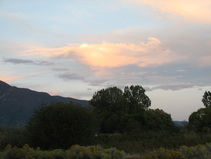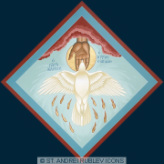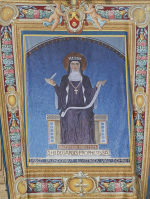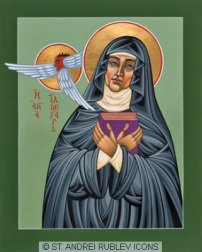 I love this time of year even though it gets a little darker every day. It brings back memories of wonderful Fall colors, falling leaves, and the air getting that crisp feel to it as temperatures cooled off. Where I live now, the leaves do not seem to change and what are underfoot are not dead leaves but tons of acorns. No matter, the memories of Fall are still vivid and real to me, having grown up in the northeast. I get a little obsessed with finding Fall colors and pumpkins and that sort of thing. I am unlike most people who get this way in the Spring, not in the Fall. I admit it: I have Fall Fever! (This is not to be confused with hay fever, which many of us get too.) This time of year I pine (pun unintended) for those crisp Fall days when I would get my pumpkin, think about eating some of it as a pumpkin pie, start wearing sweaters, rake up leaves, and drink a lot of hot tea. But something else goes on at this time of year. Our liturgical calendar ticks away and we get closer to the end of the year, with the season of Advent looming: the start of the new liturgical year. As much as I love Advent, I think it would be a mistake to focus on Advent too soon and rush through this time of year as if it was only a spring-board to getting us there. This time of year has a spiritual richness all its own. We just celebrated some terrific saints throughout the months of Ordinary Time which came before these late October days. October is also celebrated as a month in honor of Mary. This year we have the extra special celebration of The Year of Faith, and a remembrance of Vatican II which was 50 years ago. These are all excellent celebrations, but I do not want to lose the special gift of these weeks at the end of October and into November. It is at the end of October and beginning of November that we shift our focus to those who have gone before us with the feasts of All Saints and All Souls. While these two feasts are actually November 1 and 2, we always begin all our feasts on the eve of the night before. Therefore, in reality we begin this focus on October 31 at sundown. As a child I focused on Halloween and never really cared what it really meant, but as an adult I know it is not about costumes and pumpkins and the like. It is about remembering those who have gone before us and celebrating all those saints and loved ones who we cared about and in fact, still care about. It is a time when we should slow down just a bit when it gets dark earlier and spend some time being grateful for those people who have paved the way for us, both in our lives and in our church. We should listen to their wisdom, maybe reading a book written by or about a saint; and maybe it would be a great time to pull out those photos of our beloved dead and remember a story they told, or an event they lived through which is part of our family identity. If any of these people had not done whatever it is they did to contribute to the world, none of us would be who we are! The ancient Celtic people had a tradition that when the light and dark were getting to be almost equal they would celebrate what they called the thinnest time of the year. They would hunt and prepare all the food they could store for the coming winter and have a festival on the night they thought was the thinnest, burning the entrails and bones as a way of saying thanks. These "bonefires" (hence the word "bonfire") would happen on the eve of All Hallows as a way to say thanks to God for the blessings they had received. This eve was a way of remembering that all blessings are spiritual and hence, they wanted to remember those who came before them in thanksgiving as well. This night was when they believed the veil between time and eternity was the thinnest, and this is why they called these weeks leading up to the equinox the thin times. While these traditions had their start in the pagan/Druidic Celtic culture, it was continued with modification in meaning and intent by the Celtic Christians, who understood that the Eve of All Hallows - (that which is holy is “hallowed”) - was indeed a time of thanksgiving, but also that it was a time of thanking God for the saints who went before. That is, it was a time of connection with the entire Church. Sometimes it is easier to feel a sense of God's presence in the quiet of the night when things get a little more still and distractions are fewer. That is only true when we allow it to be so. We have to turn off the TV, computer, cell phone and other electronic devices, and we have to learn to take a few minutes to breathe in the quiet. If we allow ourselves to do so, it is amazing what can come into our consciousness in remembrance of those who have gone before us, and also of what God may be trying to awaken in us. Maybe a good challenge (truly a gift to ourselves and to God) would be to take up the Scripture from the liturgy of the day and let it seep into your heart and mind, reflecting on what God may be trying to say to you through it. Another suggestion would be to simply remember a family member or friend who has gone before you and share some story of them with other members of your family, and let them share stories, too. Or maybe you might share in an activity such as carving a pumpkin and saving the insides to bake a pie together. This time of year is a gift from God to us if we let ourselves accept it. We lead such busy lives that it is as if God wants us to take the darkness and make it bright with our memories. And our activity is meant to be more focused on sharing with those we care about. That follows through to the season of Advent and Christmas, but rather than it being an abrupt shift we make after the Thanksgiving Parade or football game has finished, it can be a gradual shift we begin to make now. Once we have accustomed ourselves to the quiet in our heart, some focused activity and/or memory sharing, we can gradually turn on the lights and the merry making will feel so much more natural. It is not "four weeks and it's over", as our society would make us have in December. It is a time that begins now. And if we begin now, it will continue well into next year and into the seasons that we equate more readily with celebration. Let us take the time to learn from this season which has begun and is highlighted by All Saints Day and All Souls Day. Let us attune ourselves to God's gentle presence as the days get darker and the hush of early nightfall is upon us. Let us accept the gift of shared memory and activities with our families and friends so that it carries through to the coming season of “Advent waiting.” ~ May you feel the closeness of your dear loved ones who have gone ahead of you and may you have a sense of gratitude for their gift of love to you. May you be open to the voice of the Lord who speaks His "I love you" to you in this thin time. And let us meet in the Heart of Our Lord who gifts us with all the Holy Ones in our lives. Peace!  Earlier this week I had the wonderful opportunity to sit for about a half hour outside my church facing the beautiful park across the street. This time of year in Houston we sometimes have days with outstanding weather to savor, and this was one such day. By just sitting and observing what was happening in the park, I had an experience of the beauty of nature. But especially beautiful was watching the people who were enjoying the park. "People-watching" is really a lot of fun, but it is also a wonderful way to see God's presence around us. As I sat there enjoying the late afternoon sunshine, I watched mothers with their little children playing on the swings; the air was filled with the sounds of laughter and children playing. An occasional squirrel darted past; a man walking a dog (which became interested in one of the squirrels) also paraded past. A friend even happened by, quite unexpectedly, and we had a short conversation which was really enjoyable. Just when I thought it was about as good as it could possibly be, (and it was really great!) a couple rode up on their bicycles. The father had their young son in a baby trailer attached to his bike. They got off their bikes and the dad began to throw a small football around for all three to play with. The boy looked like he was no more than two and a half to three years old. This became the focus of my attention, and hence my meditation. The father would toss the football to the mother and yell to the son, "Tackle her, tackle her." Then she would toss it back and again he would yell, "Tackle! Go for the tackle." The little guy would run over and grab Daddy's leg and over he would go. Sometimes Dad would "tackle" the little guy, which looked more like they were wrestling playfully than anything else. And sometimes the little guy would "tackle" Mom or Dad. It was obviously a time of loving playfulness, and it was clear they were all having a fantastic time. The "tackles" were gentle and really more of the young boy being grabbed in a sort of hug as they fell on the ground together. But what was clearest to me was that this family was able to have a lot of fun outside on a glorious afternoon made more glorious by the presence of love and laughter. And honestly, I think I was having near as much fun as they were! Part of what I was thinking as I watched the family interact was how easy it is to have fun with those we love. This was all very simple: a pair of bicycles, a toy football, and a bit of lawn. There were no pieces to assemble, no warranties to run out, no batteries needed for operation, and it was not passive, but true interaction. The action was filled with love. It was so very obvious that this was a healthy, happy family. It made me realize that there was the presence of God all over this scene unfolding before me. Anywhere there is love, God is present. Further, it made me realize that God likes to have fun along with us. I know that sounds a bit odd, but God is the author of all that there is, and that includes our ability to have fun and to laugh. When we read the Gospels we often find Jesus having fun with a number of his friends. He ate and drank with people all the time. One of the first times we meet Jesus in John's Gospel He is with His friends and a new friend is being introduced to Him. Nathanael had previously balked about Jesus, telling Philip in reference to Him, "Can anything good come out of Nazareth?" Jesus knew that, and when Nathanael was brought to Him, He said, "I saw you under the fig tree." Nathanael’s response, besides being startled, was to say, "You are the Son of God." And Jesus replied, "You will see greater things than this," as if to say, “If something like that impressed you, wait till you see what is to come.” The entire interchange so "disarmed" Nathanael, which Jesus intended, that Jesus must have laughed quite a bit. It was rather playful on the part of Jesus. (Paraphrased from John 1:45-51.) The very next passage in John's Gospel is about Jesus at a wedding, and the writer indicates it is the 3rd day of the celebration. This tells us that He was enjoying the party for a number of days. In fact, His mother was there and so were a few of His friends who would later be chosen as His apostles. He seemed to be sharing a good time with His family and friends when it became clear that it was His time to begin His ministry.  If we forget that God has a sense of humor and that playfulness is important, we can become one sided and out of balance. Many great saints exhibited humor in balance with the more serious aspects of their lives. An example of this is St. Francis of Assisi who loved to sing and dance, even playfully "preaching" to the creatures from time to time. He was so full of joy at the beauty of creation that he could not contain it. Another saint with a great wit was St. Teresa of Avila, who used to crack wise about many things, such as the time she fell off her donkey while crossing a river on the way to founding a new convent. She was reported to have looked up toward Heaven and said, "If this is how you treat your friends, it is no wonder you have so few of them!" Of course she was joking, and I know she was laughing at herself, not taking the moment of embarrassment, or herself, too seriously. Then there was St, Philip Neri, who loved practical jokes and is the patron saint of jokes and practical jokers. (Seriously!) Finally, there was Blessed Pier Giorgio Frassati who really loved a good practical joke. He and some of his friends nicknamed themselves Tipi Loschi, (translated as Shady Characters, or the Sinister Ones), and pulled off some relatively complex practical jokes. These jokes were never at someone's expense or hurtful, but rather were always able to make everyone laugh. What is important for many of us is to learn to laugh and play more, especially in lives that are stressful or harried. We rush all over at a fast pace most of the time and it is easy to lose sight of what matters. By being able to laugh, especially at ourselves, not taking ourselves too seriously, we can put things into perspective more readily. Having a sense of playfulness will keep us young at heart, being like little children, as Jesus suggested. Best of all is when we can keep laughter and playfulness in our families, such as the young family I witnessed at the park. It strengthens bonds and makes everything easier to take. Laughter and playfulness are signs of love. And signs of love are signs that God is present. When we enjoy each other, we really are living the heart of love. Isn't enjoying our loved ones and our time spent together what it is all about? I have no doubt God laughs at me...a lot... but that is fine with me because it teaches me to laugh more at myself and to lighten up. And it teaches me what really matters and who really matters most in my life. May each of us find humor and playfulness in the midst of every day! May we have a sense of God's laughter in the shared moments of our lives! May we have the grace of interior freedom such that we can more easily enjoy laughter and joy! And may our joy lead us to gratitude and deeper love! Let us meet in the laughter and joy of the Heart of our Lord! Peace and joy to you!  Above I referred to Blessed Pier Giorgio Frassati and his group of friends called the Tipi Loschi. For more insight into this go to http://www.frassatiusa.org/index.cfm?load=page&page=412  Today is the Feast of St. Teresa of Avila. She is one of my heroes, as you know if you have read my previous blog entry on her. I think part of my attraction is that St. Teresa was so practical in her approach to everything. Her teachings on prayer, and even the instructions she gave to her sisters concerning how to live in the enclosed community, were practical. However, she never claimed to teach what was easy. In fact, she would say that anything worth doing in the spiritual life is not necessarily easy and requires work, but that the freedom which comes from the practice of prayer is what leads us to holiness, and therefore to God. This is definitely worth the effort! Reading the works of St. Teresa is also worth the effort. She wrote in such a way that anyone can pick up her books and learn from her. She is not difficult to read. Most of what she wrote was directed to her religious sisters so that they could advance in the practice of prayer and therefore on the road to perfection. I think she called it the "practice of prayer" for a reason: prayer is a process and part of a relationship. All relationships, especially those which mean the most to us, require work. Relationships do not just happen by themselves. This is true of our relationship with God: although God does everything He can to make it easy for us, we have to put in the effort. He gives us the invitation to prayer continuously and gives us the graces we need to grow in prayer, but He never forces us to do anything. Therefore we have to take up the initiative to accept the gift, which means doing the work of growing in this relationship. It is not a one way street, though. God does more than meet us halfway. This is what St. Teresa wants us to know. St. Teresa tells us that if we begin simply and advance from vocal prayer to meditation, and even to contemplation, we do less and less of the work as we progress. Eventually God does all the work, and we simply let Him. We go from doing to being. At that point, our prayer is pure gift from God. But to get to this point we have to do the work of being regular in our prayer. Just as an athlete may be proficient in a particular sport, the athlete cannot rely on talent alone. The athlete has to work his or her muscles to grow and progress. It is an arduous process of working out which requires a bit of sweat before they can ever step out on the court or field. St. Teresa tells us that prayer is like that, also. We have to put in the time and the practice, so to speak, dialoging with the Lord, listening to the Lord, and being receptive to His presence deep within and all around us. We learn to recognize the subtle signs of His presence until we are able to surrender our agenda, our will, to His and let Him give to us whatever graces He is offering. St. Teresa was aware that not all people pray the same way; some are not capable of contemplation or even meditation for whatever reason, and not through any fault. She recognized that in prayer "one size does not fit all." For these she recommended praying the Lord's Prayer slowly and deliberately. She outlined a method for praying the Our Father in what she called the prayer of recollection. She called it this because she said, "The soul collects its faculties together and enters within itself to be with its God.... Those who by such a method can enclose themselves within this little heaven of our soul, where the Maker of heaven and earth is present, and grow accustomed to refusing to be where the exterior senses in their distraction have gone or look in that direction should believe they are following an excellent path and that they will not fail to drink the water from the fount; for they will journey far in a short time." (The Way of Perfection, chap. 28, paragraph 4 and 5.) St. Teresa wants us to know that God is close to anyone who is at prayer. She said, "All the harm comes from not truly understanding that He is near, but in imagining Him as far away." She goes on to say: "For indeed we have heaven within ourselves since the Lord of Heaven is there." (The Way of Perfection, chap.29, para.5) We do not need to seek God anywhere but within ourselves as we pray. If our hearts are turned to Him, He is there. The most beautiful reminder St. Teresa gives us is this: while we may be distracted or struggle to keep focused on Him, God never takes His eyes off us! (The Way of Perfection, chap. 26, para.3) That's right: no matter what happens during your prayer time, God is never distracted away from you and it is He who gently calls you back should you become distracted. Better still, He always has His eyes on you even when you are not praying. He never takes His eyes off you! It is important that we take to heart the words and teaching of St. Teresa. The heart of her message is that we need to do everything with love. No matter what we are able to do in prayer, no matter how we are feeling about it, if we bring love to our time with God, that is perfect prayer. He will do the rest. It is important to never let anything get in the way of our time with Him. He is our friend of friends and the one to whom we can always turn. He is the one who loves us so much He can never take His eyes off us. Who would not run excitedly each day to be with a best friend, that one with whom you can totally be yourself, to spend a little time? Being with our best friend would be the highlight of any day. I know it is for Him! Let us ask for the intercession of St. Teresa that she would help us to grow in our life of prayer and therefore in our relationship with God! Let us imitate her in that desire to be with the Lord in prayer! Let us strive to pray always, so as to keep our eyes trained on Him! And let us be filled with gratitude that He never takes His eyes off us! Let us continue to meet in the loving gaze of our God! Peace! (Above icon of St. Teresa of Avila by Rev. William Hart McNichols. You can find this and more of his work at http://www.standreirublevicons.com.)  I was reflecting about Heaven recently while at a memorial Mass for a friend. Then I saw the front cover of a popular magazine which headlined Heaven and realized that many of us have a fascination with Heaven. I think this is a good thing since our lives should be oriented toward arriving there when this earthly life is over. Indeed that is the message of the Scriptures and it is why Jesus Christ came to this earth, suffered, died, and rose again: we come from God and we are meant to return to Him. There is no Good News better than that. One thing is sure: we have to remember that all descriptions of Heaven will fall short. This is because we are trying to describe the indescribable. None of us truly knows what Heaven will be like since none of us have dwelt there. Oh, I know. I read the article in the magazine and I have seen the books about people who have had after life experiences. While I like it that they help others who may need the jolt of personal testimony to believe that Heaven exists, none of those people have dwelt there. They have visited maybe, but they have not dwelt there. Furthermore, while I never will knock anything that helps people's faith, many of us do not need such testimonies to know that Heaven truly exists. I believe because our Lord told us so through the revelation of Scripture. That is truly good enough for me. Nonetheless, it is important to reflect on what Heaven is from the sources which reveal truth, the Scriptures and the Catechism. We know Heaven is life with God forever. We are forever in the fully revealed presence of the Trinity: Father, Son, and Holy Spirit. We are forever in the presence of the Virgin Mary, the angels, the saints, and all those who have gone before us "marked with the sign of faith", that is, the baptized. One of my favorite truths is that we are all united as the Communion of Saints: once we are baptized we are forever united with all of the baptized who are in Heaven or are awaiting Heaven. (The only ones we will not be united with are those who have chosen hell.) Through the sacraments we maintain that union forever, just as we maintain our union with God forever. It is a gift to us, so we are free to accept it or reject it. Rejection of that gift is the only thing that can separate us from God and dwelling with Him forever. Unless we have done something really egregious for which we have never asked forgiveness, or unless we have picked up habits which have led us away from God little by little and we are so far away from Him that the breach has destroyed our relationship with Him, we have nothing to fear from death. In fact, death is a gift because it reunites us with Him in a stunning and amazing way, beyond our imagining. And if we have done anything to separate ourselves from God, He loves us so much that He offers reconciliation and the ability to atone so that we can renew the relationship. In this life, it is never too late. In Heaven we will have the beatific vision; that is, we will be able to see God face to face. We will have full consciousness and understand mysteries we could not grasp in this life. The Scriptures tell us that our souls will be in Heaven until the Second Coming of Christ when, after the Last Judgment (those not yet judged) we will enjoy the resurrection of the body. We will have our bodies, now fully perfected and glorified, joined again with our souls. The The Scriptures and Catechism tell us that we will continue to have our will, though perfected and incapable of turning from God, and our bodies will have new properties, such that we can pass through solid objects. We will be able to eat, however, though we will not need it to live. (I cannot imagine Heaven being Heaven if we could not eat!) We will be reunited with all our loved ones who have gone before us. And we will be radiant with the beauty of God, the beauty of Love. In Heaven there will be no more tears, suffering, pain, or imperfection. We will be in eternal peace, happiness, beauty, and joy in a perpetual celebration of the love of God. I am not sure if many of us have ever had a taste of true joy, but if you have, you will know that for this alone, it is worth everything we have to go through in this life. This joy is a deep reality, which is like knowledge and a deeply incorporated "feeling", deeper than the deepest happiness on earth, all rolled into one and then some. No matter what or who contributes to our happiness on earth, this is not the same as the joy to come. Things that make us happy here are fleeting. We continue to hunger after we have them. The joy of Heaven is eternal. However, sometimes we get a taste of this joy which is given us through a sacrament, or through a grace-filled moment of prayer. It comes briefly in this life because we cannot sustain it. But it is a foretaste of the eternity of joy and communion with the Lord of Life that penetrates the soul until we can get there forever. It can never be forgotten. Many of the saints described this experience, and once they tasted of it, they never lost sight of the desire for union with God again. St. Bernard of Clairvaux said: "Never has man seen the inaccessible light, never has his ear heard the inexhaustible symphonies, nor his heart tasted that incomprehensible peace." (1) St. Augustine said: "There a light shines that no place can contain; there praises and songs resound that are unlimited in duration. There are fragrances the air does not blow away, savors that never fade, goods and sweet joys unaccompanied by any distaste of surfeit. There, God is contemplated continuously, is known without any error or apprehension, and praised without weariness or diminution." (2) The author of a book I am reading, (which was the single most influential book read by St. Thérèse of Lisieux, by the way) said this: "Heaven is God's ideal, the repose of His intellect. Let us add: it is the repose of His heart." (3) I believe that is true: Heaven is the repose of God's heart and we will forever rest there, within the very life of the Giver of Life and within the very beauty of the Maker of all Beauty. In a word, we will forever dwell in Love.  With all that said, however, there is one reason we should aspire to Heaven above all else and that is to love the Lord with all that we are. If Heaven is a goal simply as an alternative to hell, or because we want to be happy forever, (who doesn't?) then that is really not the highest of intention. Our goal in reaching Heaven is not for the "place" but for love of the God who dwells there! We should desire to be there so that we can love God, Father, Son, and Spirit with no constraints and no inadequacies. Isn't that the goal of growing in holiness? We do not grow in holiness just to get in the Pearly Gates. We grow in holiness to return the love of the One who loves us beyond our imagining. In short, we want to be there to love God back! That is what will give us the greatest joy we can know. Our love for Him can be fully expressed and we can receive the greatness of His love in return. He longs to give that to us!! May we be filled with the desire to persevere in this life such that we can reach our goal of life with God forever in indescribable light, joy, and love. May we be a beacon to those around us who may be struggling on the journey, helping them to stay faithful and firm in their resolve to strive for Heaven. May we desire to reach for Heaven not only for the joy it will give us, but so that we can worship, praise, and love the Lord for all eternity and in so doing receive the fullness of His presence, which is Love. Let us continue to pray for each other, that we can remain faithful to our call. Let us meet in the Heart of the One who longs for us more deeply than we can ever long for Him. Peace!  (Photos all mine.) (1) St. Bernard of Clairvaux, Sermon 4 on Christmas Eve (2) St. Augustine, De spiritu et anima Both of the above quotes and the quote in (3) were found in the book I mentioned above, of which St. Thérèse said: "Reading this book was one of the greatest graces of my life." This book is: The End of the Present World and the Mysteries of the Future Life which is a series of retreat conferences given by Fr. Charles Arminjon in the 1880's. It sounds exotic, but the conferences were all based on Scripture and sound doctrine.  To the left: The Holy Spirit, The Lord, the Giver of Life, The Paraclete, Sender of Peace, by Rev. William Hart McNichols Can be found at http://www.standreirublevicons.com/gallery.php?action=viewPicture&id=189 If you are interested in purchasing any of his work, more icons and images are available at www.fatherbill.org. You can also commission Fr. Bill to paint an original icon if you wish. Contact information is on his website.  After a centuries long "wait" Hildegard of Bingen, a German mystic, was canonized in May. This past Sunday Pope Benedict XVI declared her to be a Doctor of the Church, an honor that is shared with 34 other people from throughout Church history. Only three of the others are women. That is very rarified company! Many of us do not know much about St. Hildegard, but she is definitely an interesting figure. St. Hildegard was born at the end of the eleventh century, possibly in the year 1098. She was from a very large family and of noble birth, but not much else is known about her origins. She began to report that she was having visions at a rather young age; she is said to have started to have these visions at the age of three! Whether it was that or some other reason which remains unknown, her parents brought her to the local Benedictine convent where she entered the community. Maybe they thought that having visions was a sure sign of a religious vocation (it isn't!), or maybe they thought it was a sign of holiness (it isn't!) and a convent was where she needed to be. Maybe they were overwhelmed at the thought of having a daughter who was having visions regularly, or maybe they simply thought that the nuns could better handle the situation. Either way, she entered the community at the age of around 14 and lived as a sister the rest of her life. Some accounts of her life indicate that she was entered into the convent with someone older named Jutta, who was a type of caretaker, when Hildegard was eight years old. Either way, Hildegard was very young and was immersed in a world of religion and spirituality where she seemed very much at home. Hildegard continued to have visions which attracted many to her, and eventually she became prioress of the enclosed religious community. Hildegard was a brilliant woman. She learned to read music and composed what may be the world's first opera. It is said that she invented the first indoor plumbing for the sisters in the convent. She was an expert at using herbs and natural substances for healing. This is not why she was named a Doctor of the Church, though. (Pun intended.) A Doctor of the Church is someone whose contribution to theology or doctrine is of great importance and it is her writings that are an indication of what her contribution was. She wrote three theological texts, the most widely known called Scivias, (“Know the Ways of the Lord”) which is widely available to this day. In it she wrote extensively about the Trinity, Christ, the Church, the Sacraments, and the Kingdom of God based on the visions she had. So while she obviously had an extensive knowledge in many areas, and these were all incredible contributions to the medicine of her day, music and the like, it is her theological teaching for which she has been declared a Doctor. Also very important in all of this was that St. Hildegard had a tremendous impact during her lifetime in Germany. For a woman to have had the amount of influence and respect which she had is remarkable. No doubt it was hard won, however. She did have her detractors, but she continued to work at sharing her wisdom. Women were banned at that time from any public speaking or preaching, and yet Hildegard was known as a master of rhetoric, attracting audiences wherever she went. That is correct: she traveled all over Germany sharing her knowledge and preaching publicly, something completely unheard of for a woman at that time and for a long time afterward. She even preached to clergy and called for reform, which would have been controversial to say the least. St. Hildegard is important because she teaches us not only from her visions and theological understanding, but because she was free enough to follow a call which put her at odds with public convention. She seems comfortable in her own skin; that is to say, she must have had the confidence to understand that if God gave her so many gifts, they were gifts to be shared. She could have written books and sat back hoping for the word to get out. But in her world before the printing press that was not very probable, so she took the proverbial “bull by the horns” and spread her knowledge in any way she could. She had the courage to move against the constraints toward women during her lifetime and shared a vast knowledge with the world around her. The tenacity she possessed allowed her writings and her musical creations to survive throughout the many years since her death in 1179 at around the age of 81, until this day. (One can find recordings of her music and copies of Scivias relatively easily today.) St. Hildegard should be an inspiration to those of us who struggle with what our purpose may be in this life. She did not write for posterity or to leave a legacy. She wrote because she wanted to express what she had learned. She knew the visions were not for her alone, but rather that they were to be shared. Hildegard should help us to see that no matter what constraints there are on us due to our resources or situation, whatever our contribution is, it is important if it is directed toward furthering the Kingdom of God. If our contribution is to raise wonderful kids, or if it is to make a scientific breakthrough, or if it is to simply make the world around us a better place because we were there, then we are to put our energy into that, not worrying about what anyone else thinks or how society may be judging us. Like St. Hildegard, we can find the truth of who we are in the Lord, and using the gifts He has given us, we can contribute to the well-being of the world around us, even if it seems like what we are doing is of little importance. I am sure that having visions is not understandable to many people, and may have been off-putting to some. But that did not stop St. Hildegard from sharing her wisdom. That is heroic and I am confident she suffered a bit along the way. But share she did, and we are the richer for it. May we be courageous in sharing who we are and the gifts we have been given for the sake of the Kingdom. May we be like St. Hildegard, daring to be who we are even if it does not quite fit in with the expectations of the culture. May we be true to the calling we have from God, secure in the knowledge that it is He who leads us. And may we learn to open our eyes to the "vision" we have been given through Scripture, the writings of the Saints, and the example of their lives so that we can grow closer to the Lord. Let us meet in the Heart of the Lord, the Source of all vision! Peace!  Hildegaard of Bingen, icon written by Fr. William Hart McNichols. You can find it at Fr. Bill's website http://www.standreirublevicons.com/gallery.php?action=viewPicture&id=66 Divine Love, the heart of hearts, abounds in every grain of being, from atom's gleam to starry sky, from darkest pain to brightest joy. Unceasing love kindles life - a royal promise sealed with the kiss of peace. St. Hildegard of Bingen An excellent book of prayers and devotions written by St. Hildegard from which the above was taken is the little book Hildegard of Bingen edited by Mirabai Starr. |
Heart Speaks to Heart
|

 RSS Feed
RSS Feed

